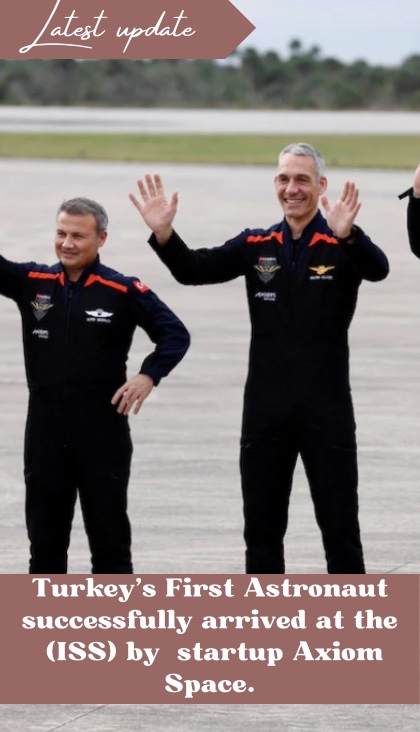A four-man crew, featuring Turkey’s inaugural astronaut, successfully arrived at the International Space Station (ISS) as part of a two-week mission facilitated entirely by the Texas-based startup Axiom Space.
The crew’s journey began with a Thursday evening liftoff from NASA’s Kennedy Space Center in Cape Canaveral, Florida, aboard a SpaceX Falcon 9 rocket and Crew Dragon capsule.
The Crew Dragon autonomously docked with the ISS approximately 37 hours after liftoff while flying over the South Pacific at a hypersonic speed of about 17,500 miles per hour (28,200 km/h). The docking process involved pressurizing and checking the passageway between the space station and the crew capsule for leaks.
The Axiom-3 crew, led by Spanish-born retired NASA astronaut Michael López-Alegría, includes Italian Air Force Colonel Walter Villadei, Swedish aviator Marcus Wandt, and Turkish Air Force veteran Alper Gezeravcı. The team is expected to spend around 14 days conducting over 30 scientific experiments in microgravity, focusing on the impact of spaceflight on human health and disease.
Axiom, founded eight years ago, specializes in providing spaceflight services to foreign governments and private patrons, charging at least $55 million per seat for organizing, training, and equipping customers for space travel. Axiom is also involved in the development of a commercial space station, aiming to succeed the ISS after its expected retirement around 2030.
The ISS, operational since 2000, has been continuously occupied under a U.S.-Russian-led partnership involving Canada, Japan, and countries from the European Space Agency.
Key Points:
- A four-man crew, including Turkey’s first astronaut, arrived at the ISS for a two-week mission arranged by Axiom Space.
- The crew’s journey was facilitated by SpaceX’s Falcon 9 rocket and Crew Dragon capsule, with autonomous docking achieved over the South Pacific.
- The Axiom-3 crew will conduct scientific experiments in microgravity during their stay at the ISS.
- Axiom, a startup specializing in spaceflight services, charges at least $55 million per seat and is involved in developing a commercial space station.
- The ISS, in operation since 2000, is expected to retire around 2030, and Axiom aims to offer an alternative commercial space station.



